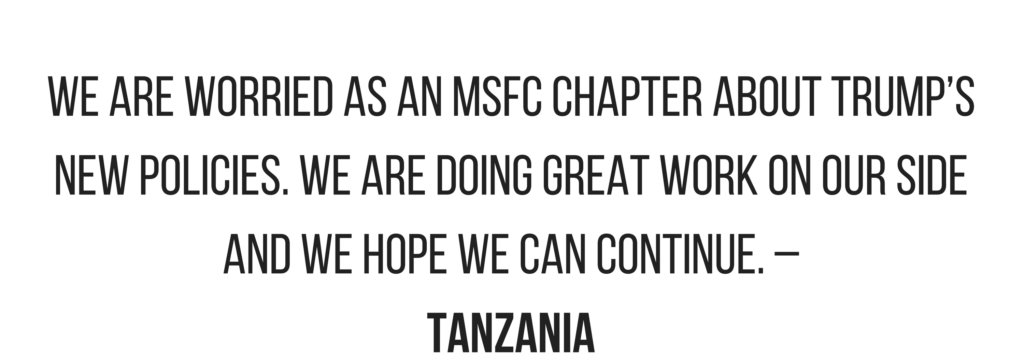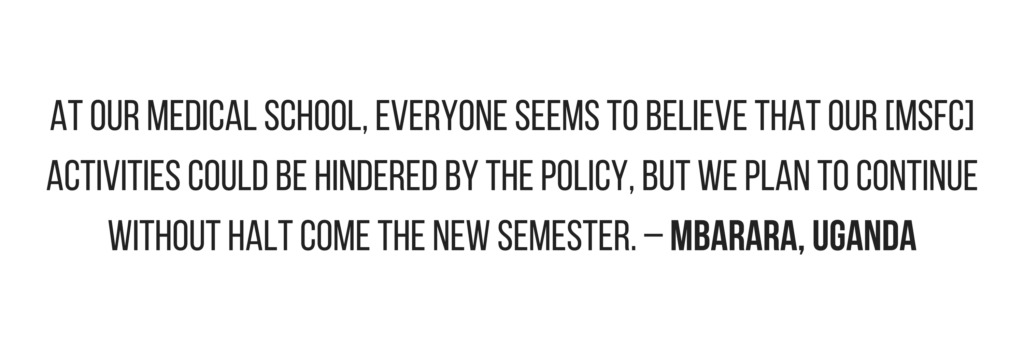On January 23rd, shortly after taking office, President Trump reinstated and strengthened the “Global Gag Rule” which prohibits US funding to any organization outside the US that counsels women about abortion, refers women for abortions, or works in any way to promote access to abortion. MSFC reached out to its chapters in Africa to assess the impact we may expect to see on our members and on the communities in which they live and study.
MSFC chapters in Nigeria, Uganda, Rwanda, Burundi, and Tanzania have reported on their initial concerns and early effects of the reinstatement of the US Global Gag Rule. In general, MSFC members had two major concerns. First, members worry there will be the same negative impact on contraceptive access that resulted from the last reinstatement of the Global Gag Rule under President George W. Bush. Second, they expect collaborative and training relationships to suffer due to partner organizations’ fears that collaborating with MSFC will violate the rule and cause them to lose funding. On the positive side, our chapters report increasing opportunities to collaborate on advocacy campaigns due to the increased awareness around the issue.
MSFC’s chapters in Africa are working in environments in which abortion is illegal or greatly restricted. Their work focuses on filling the family planning gaps in their medical training, including clinical abortion skills and education in the full range of contraceptive options. In many of these countries, developing the skills to care for women suffering from unsafe abortion is emphasized. In others, such as Uganda, student efforts have focused on overcoming the stigma around abortion within the medical community.
Impacts on Contraception
Our student members in these African countries all reported fears about contraceptive access based on the negative impact of the Bush Administration’s reinstatement of the Global Gag Rule in their countries in 2001. At the time, the loss of US funding led to staffing cuts in both direct services and outreach. Our student group leader in Burundi said, “Because abortions fall under the category of family planning, this law will lead to a population explosion in my country. It will force young people to use fewer contraceptive measures.”
On the reinstatement of the Global Gag Rule, the International Planned Parenthood Federation said, “When it has been enacted by previous Republican Presidents, evidence has shown that the Global Gag Rule has not reduced the number of abortions; rather, by eliminating access to contraception, it has led to more unintended pregnancies and more unsafe abortions.”
In the past, contraceptive services suffered under the gag rule due to, a) the loss of funding to IPPF and governments that resulted in the loss of funding for family planning clinics, and b) the loss of donated contraceptive supplies directly from the US. Our students in Africa and our training partners are predicting similar cuts in contraceptive services this time as well.
Loss of Training Partnerships
The MSFC chapter members in Africa have benefited from a growing number of training collaborations with IPPF affiliate organizations in Uganda, Tanzania, and Ghana through MSFC’s Reproductive Health Externship Program. In addition, chapter members in Rwanda and Burundi have developed strong advocacy partnerships with their countries’ health ministries and locally based NGOs. Students have expressed concern that these partner organizations may back away from working with the MSFC chapters because abortion is so directly a part of the MSFC mission (Creating Tomorrow’s Abortion Providers and Pro-Choice Physicians). Students also rely on physicians outside their universities to provide the training and education not available in their formal curricula. They worry that they will have difficulty engaging those physicians due to the stigma that follows this decline in US funding.
Direct Feedback from the Students
Young people who have not been exposed to family planning education will stigmatize the idea of voluntary abortion so our ability to organize on our campus will be affected. In addition, our education may suffer due to difficulty planning MSFC events if we cannot find physicians to educate us. We are also concerned that manuals on reproductive education may not be available due to funding issues. – Burundi [MSFC note: Burundi is a strongly Catholic country and this chapter has suffered from both the civil war and religiously-based conservative policies on reproductive health at their school.]
This is obviously going to increase the stigma towards MSFC members in our school. Even with those that were re-thinking that abortion could have positives, this is going to end up forcing many chapters here in Uganda to focus more on contraception and family planning topics rather than abortion topics. – Makerere, Uganda
The bulk of effort now is to educate young and old on the importance of choice and why they need to press the government to make legal provision for the service. – Nigeria
Opportunities
Our physician training partners from Uganda and Tanzania echoed the concerns of the students but felt that MSFC chapters have a unique opportunity to promote abortion and family planning education at their schools and in their communities because they are unaffected directly by the US policy. Because many of our chapters are well established in their community, they can carry on the work of their community partners who are restricted by the policy. Our chapters in Rwanda and Burundi have testified before their legislatures about the importance of safe abortion and they plan to continue this work. In Nigeria, our student leader felt that the reintroduction of the global gag rule could be used as an opportunity to educate around the need for safe and legal abortion.
All of MSFC’s student and faculty partners in Africa expect the reinstitution of the global gag rule to lead to a rise in unsafe abortions. They recognize that they will have a special obligation to use the skills they have gained in MSFC to save women’s lives.
On a final note, this is the perspective of an MSFC member from Uganda who participated in the MSFC Reproductive Health Externship program and is now using the skills she gained to serve her community:
“I think the policy will not reduce abortions but will lead to more unwanted pregnancies and later increasing maternal mortality. As a medical doctor I can’t run away from it because the maternal mortality due to complications of unsafe abortions is very high because a lot of poor practice is still going on in the villages, and I will still receive a bleeding mother in a regional referral hospital, needing quality surgical abortion skills to save her life.”